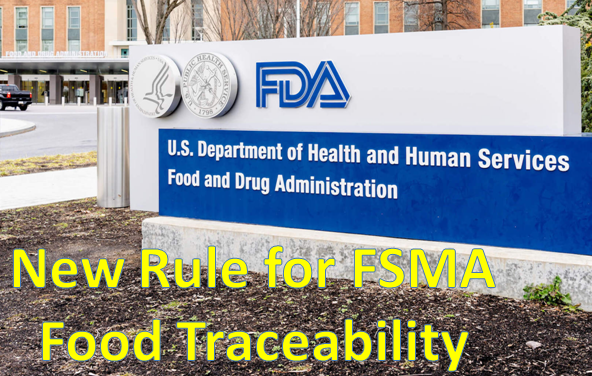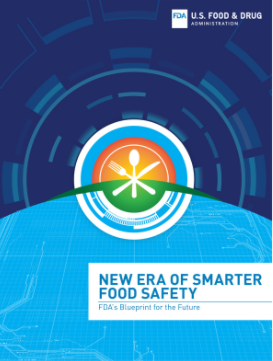FDA proposes a new rule for FSMA food traceability as part of the New Era of Smarter Food Safety initiative

On September 21, 2020, the U.S. Food and Drug Administration (FDA) announced a proposed rule for traceability and recordkeeping requirements for the most vulnerable foods. The published list (called Food Traceability List (FTL)) include cucumbers, fresh herbs, leafy greens ( including all lettuces and kale, chicory, watercress, chard, arugula, spinach, pak choi, sorrel, collards, and endive), melons ( including watermelon, honeydew, and cantaloupe), peppers, sprouts, tomatoes, tropical tree fruits (mangoes, papayas, lychees, starfruit, and guavas), and fresh-cut fruits and vegetables.
Why traceability is so important
The goal of the proposal is to track the foods at every step of the supply chain. In the FDA FSMA section 204, Congress instructed the FDA to expand the recordkeeping requirements for risky foods to establish precise food tracking of sources when needed to address food safety risks. This traceability will improve the FDA’s ability to rapidly and accurately identify foods that may be causing illness.
The lack of adequate ability to trace the sources of foods in many outbreak investigations caused a slowdown in identifying the product, resulting in more illnesses and economic loss. Better consumer protection will be achieved by quickly identifying the source of contaminated products. It will also allow, on the one hand, to limit the scope of recalls, and on the other hand, reduce the risk of illness or death. Improved traceability will help in fast root-cause analysis to learn more about the source of the contamination.
Comprehensive traceability, with more inclusive records associated with critical tracking events in production and distribution, can help the FDA identify the exact sources of foods involved in outbreaks. Better traceability will allow the fast removal of unsafe products from the market, thereby preventing illnesses and death. Recent outbreaks of foodborne disease tied to fresh leafy greens and papayas emphasize the importance of better traceability. Complete records that can be traceable also can limit the scope of some recalls by eliminating blanket recalls.
Standardized approach to traceability

The current regulations (often called “one-up, one-back” recordkeeping) require maintaining records to identify the immediate previous sources and the subsequent primary recipients of foods. This recordkeeping provides limited information to link shipments of food through each point in the supply chain. Additionally, the recordkeeping systems are mainly paper-based and lack a universal terminology throughout the industry, resulting in difficulties in tracing back product to its origin.
The new proposal establishes the foundation for a standardized approach to traceability recordkeeping. The rule is paving the way for the industry to adopt, harmonize, and leverage more digital traceability systems in the future. Where possible, FDA claims to use existing consensus standards that industry members may already be using.
At the heart of the proposal is a requirement for manufacturers on the Food Traceability List (FTL) to create and maintain records associated with specific Critical Tracking Events (CTEs) such as growing, receiving, transforming, creating, and shipping. For each CTE, the companies would be required to establish and maintain records containing Key Data Elements (KDEs). KDEs should include the traceability lot code, the date the product was received, the date the product was shipped, and the product description. The KDE establishes a linkage that will facilitate rapid traceback and traceforward investigations during foodborne illness outbreaks and recall events.
Products on the FTL list would be required to create and maintain records related to their internal traceability program. The records would help regulators better understand a firm’s recordkeeping practices and traceability operations. The records can be kept as either electronic, original paper records, or true copies. The FDA could require firms to submit, within 24 hours, an electronic sortable spreadsheet containing relevant traceability information for specific foods and date ranges, in the event of a foodborne illness outbreak, a product recall, or other threats to public health.
The FDA encourages all food businesses to maintain their traceability records electronically whenever possible. Electronic records will expedite the identification of traceability information when needed to address threats to public health.
The proposed rule and draft Food Traceability List are available for public comment for 120 days from the date of publication.
The growers of leafy greens reaction
The California LGMA stated in response to FDA proposed traceability rule,” The U.S. Food and Drug Administration announced today they are adding traceability requirements to the FSMA for certain foods including leafy greens. We want to assure our customers and consumers that members of the Leafy Greens Marketing Agreement are already required to have traceback systems in place. This has been part of the LGMA requirements since the organization was formed in 2007.”
It appears that the members of the LGMA in California and Arizona are already in compliance with new requirements announced today.
